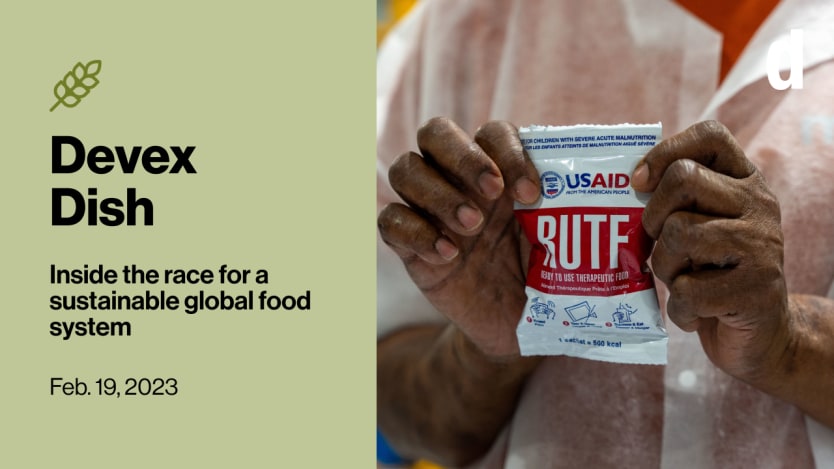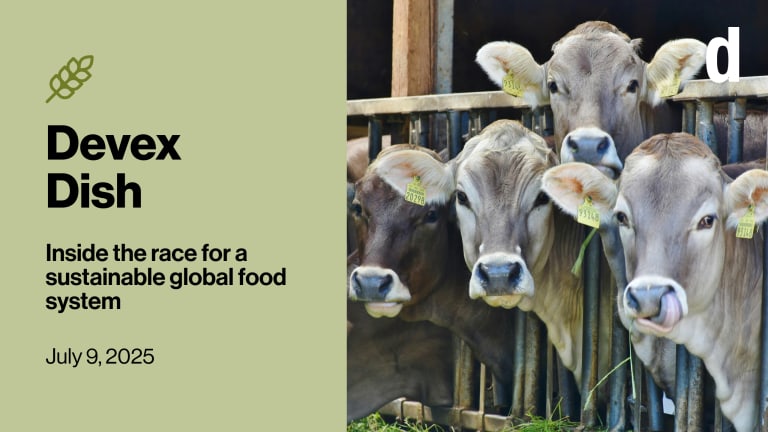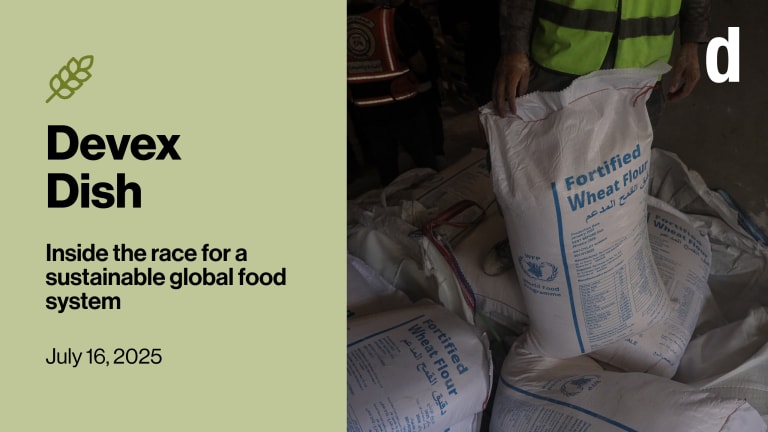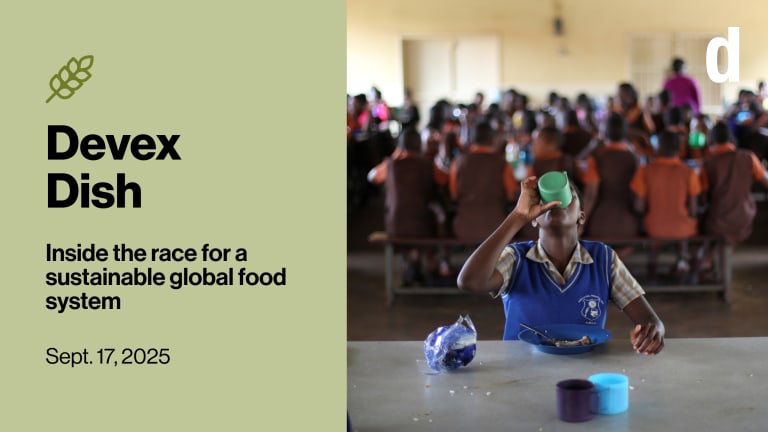
For aid groups that treat children facing severe acute malnutrition, it’s obvious that their work is lifesaving. After all, the stakes are often life and death. Without treatment, these children could face lifelong effects, such as stunting, impaired brain development, and weakened immune systems.
But when it comes to the Trump administration’s 90-day freeze on nearly all U.S. foreign aid, that work is caught in a cruel purgatory. Much of it has been subject to stop-work orders — and many groups are still unable to operate despite a blanket waiver for “life-saving humanitarian assistance,” which includes management of severe acute malnutrition.
That’s because each individual program needs to get permission to restart work if it has previously been ordered to stop. And even when waivers are granted and stop-work orders are rescinded, groups can’t access U.S. government funds they rely on to run programs and pay staff. The U.S. Agency for International Development’s payment system, Phoenix, is not functioning — so groups that do operate are often dipping into their own cash reserves, with no guarantee the U.S. will ever reimburse them.
Because the U.S. is such a big donor in this area — USAID funded more than $1 billion in nutrition programming in fiscal year 2023 — it has jeopardized the fragile and interconnected global health supply chain by which therapeutic food is produced, shipped abroad, and delivered to a malnourished child. The entire ecosystem of facilities and programs involved is affected by the aid freeze whether they get U.S. funding or not.
“The system is breaking,” says an official with a humanitarian aid organization that treats severely malnourished children, who spoke on condition of anonymity as to not jeopardize their U.S. funding. “Supplies are not getting to people. We’ve got staff being fired across the board because these organizations are supported by U.S. government funds. And you can’t run programs without staff.”
One bright spot has been the rescinding of stop-work orders for two major U.S.-based producers of ready-to-eat therapeutic food, or RUTF — the high-calorie, nutrient-dense peanut paste that is lifesaving for children facing severe acute malnutrition. Edesia and Mana Nutrition were able to resume operations one week after being told to stop.
But experts tell me that keeping those assembly lines running and those products available means little if health care workers in Haiti, Nigeria, and Yemen don’t have jobs anymore to deliver RUTFs and other care to food-insecure kids and families.
Read: ‘The system is breaking’ — US aid freeze threatens child malnutrition care
See also: The mess inside Rubio’s ‘lifesaving’ waivers
And don’t miss: Will USAID partners get paid? The verdict is still out (Pro)
+ Not yet a Devex Pro member? Start your 15-day free trial now to access the event as well as all our expert analyses, insider insights, funding data, and more. Check out all the exclusive content and events available to you.
Food for thought
Devex reporters are working around the clock and across the globe to bring you the latest insights into the effects of the U.S. foreign aid freeze. Here are some other aspects of the freeze we’re investigating:
• Can philanthropy fill the gap left by USAID’s dismantling? In 2023, the agency spent $40 billion in 130 countries, and experts say it’s unlikely philanthropy can generate such sums. But it can help fill gaps in the short term, and it can help organizations build longer-term sustainability in the absence of U.S. funding, writes Devex contributor Lauren Evans.
• Is it time for NGOs to start operating more like commercial businesses? In an opinion piece for Devex, Leidar’s Deputy CEO Lukasz Bochenek argues the Trump administration’s focus on NGO accountability and efficiency is an acceleration of existing trends, and this moment may be the wake-up call the aid sector needs.
• Can lawsuits save U.S. foreign aid? NGOs, former USAID contractors, and former USAID staffers have taken to the courts to fight back. In this episode of our This Week in Global Development podcast series, Devex’s Rumbi Chakamba, Colum Lynch, and Anna Gawel discuss the latest legal developments.
• Last week, a U.S. federal judge ordered the Trump administration to reverse its freeze of existing foreign aid programs. But it’s questionable whether the administration will comply, experts tell my colleague Sara Jerving. And in the meantime, it will be extremely challenging for organizations to restart work given how chaotic the stop-work order has been.
+ Keep up with the latest news and insider reporting with our coverage of how the Trump administration is reshaping U.S. foreign aid.
The view from Munich
Last week, my colleague Rob Merrick attended the Munich Security Conference, or MSC, where global development and the USAID cuts were on everyone’s minds. For one thing, new data from the Center for Global Development shows that 23 countries will lose more than 1% of their national income if the USAID funding freeze lasts for a full year. Eight countries face a hit of 3% or more.
Ghanaian President John Dramani Mahama was among the loudest voices at the summit, where he told attendees that the country has needed to cut $156 million of spending as a result of the U.S. aid cuts. But on the bright side, he noted, in time this situation will make Africa “more self-reliant,” boosting its food production and reducing trade barriers across the continent.
“As bridges are burning, new bridges are being formed. We need to look for those new bridges and link the world with those new bridges,” Mahama said at the event.
Meanwhile, the link between food aid and global national security may be obvious to readers of this newsletter, but it still needs to be said. Michael Werz, senior adviser for North America and multilateral affairs to the Munich Security Conference, and Amadée Mudie-Mantz, an MSC policy adviser, make the case in an opinion piece for Devex.
“Food security demonstrates the inherent link between development and national security particularly well. Persistent food insecurity undermines stability in many contexts and can exacerbate or even lead to conflict,” they write. “Conversely, conflict and pervasive insecurity negatively impact food security by disrupting agriculture and food supply chains. This is exacerbated by the use of food as a weapon of war.”
Read: Ghana on US aid cuts — ‘As bridges are burning, new bridges are formed’
Opinion: It’s time to redefine security to include development
And don’t miss the special Newswire edition: The development undertones at the Munich Security Conference
When in Rome
Also last week, the International Fund for Agricultural Development gathered global leaders from its 180 member states for its annual Governing Council meeting, where they set the organization’s annual priorities. The focus this year was rural and indigenous communities who bear the brunt of food insecurity, poverty, and hunger — despite producing a majority of the world’s food.
“At this moment in time, I think it’s very important that we continue investing in creating stable rural communities, which means global stability, and at the same time, productive agriculture also means less hunger,” IFAD President Alvaro Lario told press at the event, which Devex contributor Rebecca Root followed. Lario urged governments, development finance institutions, multilateral development banks, public development banks, and the private sector to invest in agricultural productivity with a focus on creating jobs to grow economies.
These wouldn’t be handouts, he emphasized, but investments into building resilience that are backed by assessments showing their impact. Sierra Leone President Julius Maada Wonie Bio also called for more private-sector investment in order to help build better agricultural infrastructure and de-risk the sector.
Read: U.N. agriculture fund calls for investment in rural and indigenous people
Related: Global climate funds are cutting our smallholder farmers, report finds
Chew on this
Almost 9 in 10 people are going all day without eating as hunger in Haiti reaches record high. [ActionAid]
A new report presents a roadmap to transform global food governance and ensure that food and nutrition security is treated as a universal public good. [Kofi Annan Commission on Food Security]
The U.S. Department of Agriculture accidentally fired officials working on bird flu and is now working to “swiftly” rehire them. [NBC News]








